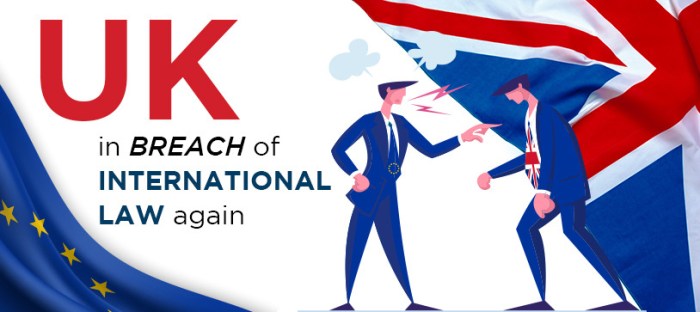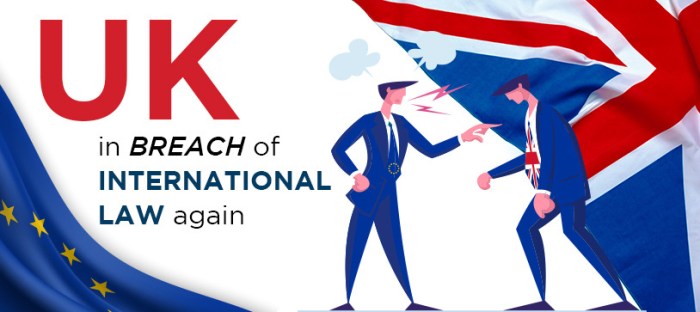
Violation of International Law: A Global Challenge
Violation of international law is a complex and multifaceted issue that has plagued humanity for centuries. From the horrors of genocide and war crimes to the systematic denial of human rights, the breach of international legal norms has had devastating consequences for individuals, communities, and entire nations.
This blog post delves into the intricacies of international law, exploring its origins, principles, and the various ways in which it can be violated. We will examine the different types of violations, the actors responsible, and the mechanisms in place to enforce international legal standards.
By understanding the complexities of this issue, we can work towards a more just and equitable world.
Definition and Scope of International Law: Violation Of International Law
International law governs the relationships between states and other international actors, establishing a framework for cooperation and order within the global community. It is a complex and ever-evolving system, encompassing a wide range of areas, from human rights and environmental protection to trade and international security.
Fundamental Principles of International Law
International law is based on several fundamental principles that guide its application and interpretation. These principles establish the basic rules and norms that govern the conduct of states and other international actors.
- Sovereignty: The principle of sovereignty recognizes the right of states to govern themselves free from external interference. This principle is fundamental to international law, as it underpins the legal equality of states and their right to self-determination.
- State Responsibility: States are responsible for their actions, both domestically and internationally. This principle holds states accountable for violations of international law and requires them to make reparations for any harm caused.
- Customary Law: Customary international law arises from the consistent and general practice of states, accepted by them as law. This source of international law reflects the evolving norms and values of the international community.
- Treaties: Treaties are formal agreements between states, binding them to specific obligations. Treaties are a key source of international law, covering a wide range of subjects, from trade and human rights to disarmament and environmental protection.
Evolution of International Law
International law has evolved significantly over time, reflecting changes in the global political landscape and the emergence of new challenges. The development of international law has been driven by various factors, including:
- The growth of international organizations: International organizations, such as the United Nations, have played a significant role in promoting and codifying international law.
- The rise of globalization: Globalization has led to increased interdependence between states, creating a need for international cooperation and the development of new legal frameworks to address global challenges.
- The increasing awareness of human rights: The recognition of universal human rights has been a major driver of international law, leading to the development of international human rights treaties and institutions.
Key Sources of International Law
International law draws on a variety of sources to establish its rules and principles. These sources include:
- Treaties: Treaties are formal agreements between states, creating legally binding obligations. They are a key source of international law, covering a wide range of subjects.
- Customary Law: Customary international law arises from the consistent and general practice of states, accepted by them as law. It reflects the evolving norms and values of the international community.
- General Principles of Law: General principles of law recognized by civilized nations are another source of international law. These principles are derived from common legal systems and reflect fundamental legal concepts.
- Judicial Decisions: Judicial decisions of international courts and tribunals can contribute to the development of international law. These decisions provide interpretations of existing rules and principles, shaping the evolution of international law.
Types of Violations of International Law
International law is a complex and ever-evolving system of rules and principles that govern relations between states and other international actors. While states are generally expected to comply with these rules, violations do occur. These violations can range from minor breaches of protocol to serious crimes against humanity.
Understanding the different types of violations is crucial for understanding the nature of international law and its enforcement mechanisms.
Breaches of Human Rights Law
Human rights law encompasses the fundamental rights and freedoms that all individuals are entitled to, regardless of their nationality, race, gender, religion, or any other status. These rights are enshrined in international treaties and customary law. Violations of human rights law can occur in various forms, including:
- Torture:The intentional infliction of severe pain or suffering, whether physical or mental, on a person in the custody or under the control of a state or its agents. Examples include waterboarding, electric shock, and prolonged solitary confinement.
- Arbitrary Detention:The deprivation of liberty without legal justification or due process. Examples include imprisonment without charge or trial, or detention based on political beliefs or ethnicity.
- Discrimination:The denial of equal rights and opportunities based on protected characteristics such as race, gender, religion, or sexual orientation. Examples include segregation, unequal access to education or healthcare, and employment discrimination.
- Freedom of Expression:The right to express one’s opinions and beliefs without fear of censorship or reprisal. Examples include restrictions on freedom of speech, assembly, and the press.
Breaches of International Humanitarian Law
International humanitarian law (IHL) aims to protect civilians and combatants during armed conflict. It sets limits on the methods and means of warfare and prohibits certain acts that are considered inhumane. Violations of IHL can include:
- War Crimes:Grave breaches of the Geneva Conventions, such as willful killing, torture, or inhuman treatment of prisoners of war or civilians, as well as outrages upon personal dignity, and the taking of hostages. The International Criminal Court (ICC) investigates and prosecutes individuals accused of war crimes, crimes against humanity, and genocide.
- Crimes Against Humanity:Widespread or systematic attacks against a civilian population, such as murder, extermination, enslavement, deportation, or imprisonment, torture, rape, or other forms of sexual violence, persecution, enforced disappearance, and apartheid. The ICC has jurisdiction over crimes against humanity committed after July 1, 2002.
- Genocide:The intentional act of destroying, in whole or in part, a national, ethnical, racial, or religious group. Genocide can involve killing members of the group, causing serious bodily or mental harm to members of the group, deliberately inflicting on the group conditions of life calculated to bring about its physical destruction in whole or in part, imposing measures intended to prevent births within the group, and forcibly transferring children of the group to another group.
Breaches of International Criminal Law
International criminal law addresses the most serious crimes of concern to the international community as a whole. It focuses on holding individuals accountable for their actions, regardless of their nationality or the nationality of the state where the crime was committed.
Violations of international criminal law include:
- Crimes Against Humanity:As mentioned above, crimes against humanity are widespread or systematic attacks against a civilian population, such as murder, extermination, enslavement, deportation, or imprisonment, torture, rape, or other forms of sexual violence, persecution, enforced disappearance, and apartheid.
- War Crimes:Grave breaches of the Geneva Conventions, such as willful killing, torture, or inhuman treatment of prisoners of war or civilians, as well as outrages upon personal dignity, and the taking of hostages.
- Genocide:The intentional act of destroying, in whole or in part, a national, ethnical, racial, or religious group.
- Aggression:The use of armed force by a state against the sovereignty, territorial integrity, or political independence of another state, or in any other manner inconsistent with the Charter of the United Nations.
Actors and Responsibilities

Violations of international law can be perpetrated by a range of actors, each with their own set of responsibilities. Understanding these actors and their roles is crucial to comprehending the complexities of international law enforcement.
The violation of international law is a complex issue with far-reaching consequences. One way this can manifest is through tax avoidance and havens, which can undermine democracy by creating an uneven playing field and eroding public trust. This practice, as discussed in the article tax avoidance and havens undermining democracy , can ultimately weaken the rule of law and create a system where the wealthy and powerful are able to operate outside of the bounds of international regulations.
State Responsibility
States are the primary actors in the international legal system, and they bear the most significant responsibility for upholding international law. The International Law Commission (ILC) has codified the principles of state responsibility in the Articles on Responsibility of States for Internationally Wrongful Acts (ARSIWA), which provides a comprehensive framework for determining when a state is responsible for a breach of international law.
- Acts of State Officials:States are responsible for the acts of their officials, even if those acts were not authorized or even contrary to the official’s instructions. This principle, known as the “act of state” doctrine, is based on the idea that a state is responsible for the conduct of its agents, regardless of whether those agents acted within the scope of their authority.
- Acts of Private Individuals:States can also be held responsible for the acts of private individuals, if the state failed to take reasonable steps to prevent or punish the violation. This applies to situations where the state had a legal duty to protect against the violation, such as the duty to protect human rights.
Violations of international law often stem from a desire for power and control, and in many cases, this desire is fueled by economic ambitions. The pursuit of dominance can lead to the justification of military expansion, a strategy often employed to secure access to resources, markets, and strategic locations.
This complex relationship between military expansion and economic objectives is explored in depth on this blog post , highlighting how such actions can ultimately undermine the very principles of international law they claim to uphold.
- Omission:States can also be held responsible for omissions, meaning they failed to act when they had a legal obligation to do so. This can occur when a state fails to prevent a violation of international law, such as the failure to stop genocide or crimes against humanity.
Individual Criminal Liability
While states bear primary responsibility for upholding international law, individuals can also be held criminally liable for their actions that violate international law. This principle has gained increasing prominence in recent decades, particularly with the development of international criminal tribunals such as the International Criminal Court (ICC).
- Crimes Against Humanity:These crimes, such as murder, extermination, enslavement, and torture, are committed as part of a widespread or systematic attack directed against any civilian population. Examples include the Rwandan genocide and the crimes committed by the Islamic State group in Iraq and Syria.
- War Crimes:These crimes are committed in the context of an international armed conflict, such as the killing of civilians, torture, and the use of prohibited weapons. Examples include the use of chemical weapons in Syria and the bombing of civilian targets in Yemen.
- Genocide:This crime refers to acts committed with the intent to destroy, in whole or in part, a national, ethnical, racial, or religious group. Examples include the Holocaust and the Rwandan genocide.
Role of International Organizations
International organizations play a crucial role in enforcing international law, although their powers and responsibilities vary depending on their mandates and the specific international law being enforced.
The invasion of Iraq in 2003, a clear violation of international law, triggered a cascade of consequences that continue to reverberate today. The aftermath, aftermath and rebuilding iraq , was marked by instability, sectarian violence, and a prolonged struggle for reconstruction.
This turbulent period highlighted the profound impact of disregarding international legal frameworks and the long-lasting ramifications for the affected nations.
- United Nations (UN):The UN Security Council has the authority to authorize the use of force to enforce international law, as seen in the case of the intervention in Libya in 2011. The UN also has specialized agencies, such as the International Atomic Energy Agency (IAEA), which are responsible for enforcing specific international legal regimes.
- International Criminal Court (ICC):The ICC is an independent international organization that prosecutes individuals for the most serious crimes of concern to the international community, namely genocide, crimes against humanity, war crimes, and the crime of aggression. However, the ICC’s jurisdiction is limited to states that have ratified the Rome Statute, the treaty that established the court.
- Regional Organizations:Regional organizations, such as the European Union (EU) and the African Union (AU), also play a role in enforcing international law. They can impose sanctions on member states that violate international law, and they can also provide support for states that are trying to comply with their international obligations.
Comparison of Legal Frameworks
The legal frameworks governing state responsibility and individual criminal liability differ significantly.
- State Responsibility:The ARSIWA provides a comprehensive framework for determining when a state is responsible for a breach of international law. This framework focuses on the conduct of the state as a whole, regardless of whether the specific act was authorized by the state or committed by a state official.
The emphasis is on the state’s responsibility for the act itself, rather than the individual who committed it.
- Individual Criminal Liability:The legal framework governing individual criminal liability focuses on the conduct of individuals who commit specific crimes. This framework requires proof of the individual’s intent and the actus reus (the physical act) of the crime. The emphasis is on the individual’s culpability for the crime, rather than the state’s responsibility for the act.
Mechanisms of Enforcement
Enforcing international law presents a unique challenge, as there is no global police force or single authority with the power to compel states to comply. Instead, a complex web of mechanisms, both formal and informal, work together to promote adherence to international legal norms.
These mechanisms vary in their effectiveness and face numerous obstacles, but they play a crucial role in shaping international behavior.
Diplomatic Pressure
Diplomatic pressure is a primary mechanism for enforcing international law. It involves the use of formal and informal communication channels to persuade states to comply with their obligations. This can include:
- Public statements of condemnation or concern.
- Bilateral or multilateral diplomatic discussions.
- The use of diplomatic sanctions, such as the withdrawal of ambassadors or the suspension of diplomatic relations.
The effectiveness of diplomatic pressure depends on factors such as the political will of the states involved, the nature of the violation, and the level of international consensus. For instance, in cases of gross human rights violations, diplomatic pressure can be effective in mobilizing international condemnation and prompting states to take action.
However, in situations where states are determined to pursue their own interests, diplomatic pressure may have limited impact.
Sanctions
Economic sanctions are another significant mechanism for enforcing international law. These involve the imposition of penalties, such as trade restrictions, financial penalties, or travel bans, on states or individuals who violate international norms. Sanctions are often used to deter states from engaging in harmful activities, such as the proliferation of weapons of mass destruction or the support of terrorism.
- Targeted sanctions aim to punish specific individuals or entities involved in violations, while broader sanctions target the entire economy of a state.
- Sanctions can be effective in changing the behavior of states, but they can also have unintended consequences, such as harming innocent civilians or undermining economic development.
For example, the sanctions imposed on Iran in response to its nuclear program have had a significant impact on the Iranian economy, but they have also led to humanitarian concerns.
International Tribunals
International tribunals are judicial bodies established to adjudicate disputes and prosecute individuals for violations of international law. These tribunals include the International Court of Justice (ICJ), the International Criminal Court (ICC), and various ad hoc tribunals created to address specific situations, such as the International Criminal Tribunal for the Former Yugoslavia (ICTY) and the International Criminal Tribunal for Rwanda (ICTR).
- The ICJ is the principal judicial organ of the United Nations, responsible for resolving disputes between states.
- The ICC has jurisdiction over crimes against humanity, genocide, war crimes, and the crime of aggression.
International tribunals play a vital role in upholding the rule of law and holding individuals accountable for their actions. However, their effectiveness is limited by several factors, including the willingness of states to cooperate with tribunals and the challenges of enforcing their judgments.
Role of Civil Society
Civil society organizations play a crucial role in promoting international law by:
- Monitoring violations of international law and raising awareness about them.
- Advocating for the implementation of international legal norms.
- Providing legal assistance to victims of violations.
Civil society organizations can exert pressure on states to comply with their obligations and can help to hold governments accountable for their actions. For example, human rights organizations have been instrumental in exposing and documenting human rights violations around the world, leading to international action to address these abuses.
Contemporary Issues and Challenges
International law faces significant challenges in the 21st century, stemming from complex global dynamics that impact its effectiveness in addressing violations. These challenges necessitate a critical examination of the evolving landscape of international law and its capacity to adapt to the changing world.
The Rise of Populism and Nationalism
The rise of populist and nationalist movements globally presents a significant challenge to international law. Populist leaders often prioritize national interests over international obligations, undermining the principles of multilateralism and cooperation that underpin international law. They may also challenge the legitimacy of international institutions and agreements, viewing them as constraints on national sovereignty.
The Proliferation of Armed Conflict
The ongoing proliferation of armed conflicts, including civil wars, interstate conflicts, and terrorism, poses a significant challenge to the effectiveness of international law. These conflicts often violate fundamental principles of international law, such as the prohibition of aggression and the protection of civilians.
The complexity of these conflicts and the involvement of non-state actors can make it difficult to hold perpetrators accountable and to implement effective mechanisms for conflict resolution.
The Impact of Globalization
Globalization, while facilitating economic growth and interconnectedness, also presents challenges to international law. The increasing interconnectedness of economies and societies has led to the emergence of new transnational issues, such as climate change, cybercrime, and human trafficking, which require international cooperation to address.
However, globalization can also create tensions between national interests and global norms, making it difficult to reach consensus on international solutions.
The Evolving Nature of State Sovereignty
The concept of state sovereignty, a cornerstone of international law, is undergoing a transformation in the face of globalization and the emergence of new actors on the international stage. While states remain the primary subjects of international law, the increasing influence of non-state actors, such as multinational corporations, international organizations, and civil society groups, has challenged the traditional notion of state sovereignty.
This evolution has implications for the enforcement of international law, as it raises questions about the role of different actors in upholding international norms.
Emerging Trends in International Law, Violation of international law
Despite the challenges, international law is evolving to address the complexities of the 21st century.
The Development of New Norms
International law is constantly adapting to new challenges by developing new norms and legal frameworks. This includes the development of norms relating to issues such as climate change, cybercrime, and human rights. For example, the Paris Agreement on climate change, adopted in 2015, represents a significant development in international law, establishing legally binding obligations for countries to reduce greenhouse gas emissions.
The Role of Technology
Technology is playing an increasingly important role in the development and implementation of international law. The use of technology in areas such as communication, surveillance, and data collection has created new opportunities for enforcing international law, but also new challenges related to privacy, security, and accountability.
For example, the use of drones in warfare has raised concerns about the potential for civilian casualties and the need for greater transparency and accountability in the use of such technologies.
The Evolving Nature of State Sovereignty
The concept of state sovereignty is evolving in the context of globalization and the emergence of new actors on the international stage. While states remain the primary subjects of international law, the increasing influence of non-state actors, such as multinational corporations, international organizations, and civil society groups, has challenged the traditional notion of state sovereignty.
This evolution has implications for the enforcement of international law, as it raises questions about the role of different actors in upholding international norms.






